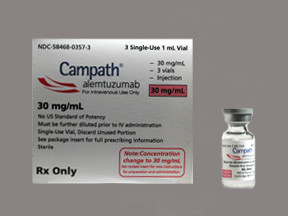ALEMTUZUMAB - INJECTION
PHONETIC PRONUNCIATION: (AL-em-TOOZ-oo-mab)
COMMON BRAND NAME(S): Lemtrada
GENERIC NAME(S): alemtuzumab
Uses
USES: Alemtuzumab is used to treat a certain type of leukemia (B-cell chronic lymphocytic leukemia, also known as B-CLL). This medication works by stopping the growth of cancer cells. Alemtuzumab is also used to treat a certain type of multiple sclerosis (relapsing multiple sclerosis-MS). It is not a cure for MS but it is thought to help by preventing immune system cells (lymphocytes) from attacking the nerves in your brain and spinal cord. It helps decrease the number of episodes of worsening and may prevent or delay disability.
How to use ALEMTUZUMAB - INJECTION
HOW TO USE: Read the Medication Guide, Patient Safety Information Card, and, if available, the Patient Information Leaflet provided by your pharmacist before you start using alemtuzumab and each time you receive treatment with this drug. Carry the Patient Safety Information Card with you at all times. If you have any questions, ask your doctor or pharmacist. This medication is given by slow injection into a vein by a health care professional. The dosage and treatment schedule is based on your medical condition and response to treatment. If you are using this medication to treat B-cell chronic lymphocytic leukemia, your doctor will increase your dose slowly to decrease the risk of side effects. Before you receive this medication, your doctor will direct you to take other medications (such as acetaminophen, diphenhydramine) to help prevent side effects. Your doctor should also prescribe other medications (such as antibiotics, antiviral medications) to help prevent infection in your body. Use these additional medications exactly as prescribed by your doctor.
Side Effects
Precautions
Interactions
Overdose
Images
Reviews
Warning
WARNING: This medication may cause very serious (rarely fatal) blood disorders (decreased bone marrow function leading to low number of blood cells such as red cells, white cells, and platelets). This effect can cause anemia, decrease your body's ability to fight an infection, or cause your body to bruise or bleed more easily. Tell your doctor right away if you develop any of the following symptoms: signs of infection (such as fever, persistent sore throat), easy bruising/bleeding, coughing up blood, unusual tiredness, fast/pounding heartbeat, dark urine. This medication may also cause very serious (rarely fatal) infusion-related reactions. (See also Side Effects section.) This medication may increase your risk of developing certain types of cancer (such as thyroid, skin). Tell your doctor right away if you notice symptoms such as unusual growth or lump in the neck, difficulty swallowing, shortness of breath, unusual/lasting hoarseness. Your doctor will monitor you closely to decrease the risk of these serious side effects. To receive this medication, all doctors, pharmacists, and patients must understand, agree to, and carefully follow the requirements of the Lemtrada REMS Program. These requirements apply in the United States. If you live in Canada or any other country, consult your doctor and pharmacist for your country's regulations.
Disclaimer
IMPORTANT: HOW TO USE THIS INFORMATION: This is a summary and does NOT have all possible information about this product. This information does not assure that this product is safe, effective, or appropriate for you. This information is not individual medical advice and does not substitute for the advice of your health care professional. Always ask your health care professional for complete information about this product and your specific health needs.


No Reviews Yet